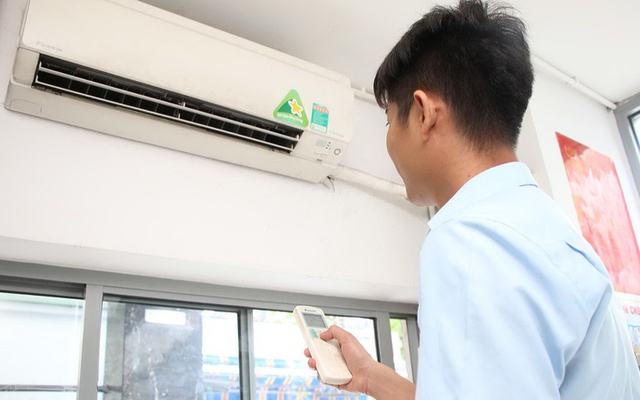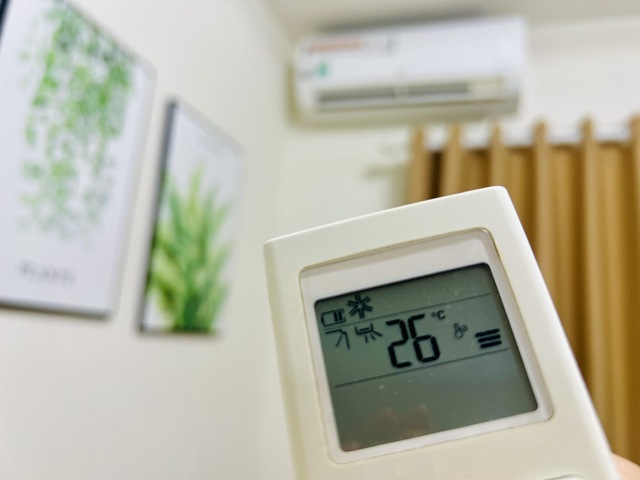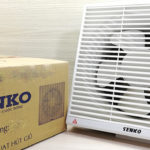During the hot season, the demand for air conditioners increases. How to use an air conditioner to avoid heat shock, harm to health, and save electricity is a concern for many people. Below are some common mistakes when using air conditioners shared by an electronics store owner.
Directing the air conditioner’s airflow directly at the body
During the hot season, many people have the habit of setting the temperature low and directing the airflow straight at the body to cool down quickly. This is a big mistake because the outside temperature is about 40°C, and if you direct a 12-15°C airflow directly at your body, it can easily lead to heat shock and respiratory problems.

Avoid directing the air conditioner’s airflow directly at the body
T.N
A quick way to cool down is to turn on the fan at the highest level and adjust the blade to face the ceiling so that the cold air can spread throughout the room faster.
According to the principle, hot air is lighter than cold air, so adjusting the airflow upward will help the cold air spread evenly across the room, creating a comfortable feeling for the entire room.
Not regularly cleaning the air conditioner
This is a very common mistake. Many people “forget” to regularly clean their air conditioners. As a result, the air conditioner accumulates a lot of dust and dirt, and the drain pipe gets clogged. It is recommended to clean the air conditioner every 3-4 months to ensure its efficient operation.
Opinion poll
Which of the mistakes mentioned in the article do you have when using an air conditioner?
You can choose 1 item. Your vote will be public.
Choosing an inappropriate air conditioner capacity
Many people believe that the larger the air conditioner capacity, the cooler it will be, and the smaller the air conditioner capacity, the more energy-efficient it will be. However, installing a large-capacity air conditioner in a small room can affect your health. On the other hand, installing a small-capacity air conditioner in a large room will require continuous operation and consume more electricity.
According to the recommendations of electronics stores, when buying an air conditioner, you should know the size of your room and ask the staff to recommend an air conditioner with the appropriate capacity. Specifically, for rooms under 15 m², you should choose a 1HP air conditioner, for rooms of 15 – 20 m², a 1.5HP air conditioner, for rooms of 20 – 30 m², a 2HP air conditioner, and for rooms from 30 – 40 m², a 2.5HP air conditioner.

Avoid placing the air conditioner near a heat source
S.Đ
In addition, you can also consider factors such as the ceiling, window direction, and the number of people using the room to choose an air conditioner with a capacity greater than 0.5 – 1HP.
Placing the air conditioner near a heat source
If the air conditioner is installed near a heat source or in a corner with obstacles in front of it, the amount of air released will decrease, resulting in uneven room temperatures. Moreover, installing the air conditioner near a heat source will make the air conditioner work continuously, leading to overload and reduced lifespan.
According to the advice of experts, you should place the air conditioner in a closed corner of the room, avoid sunlight, and keep it away from heat sources such as the kitchen and refrigerator.
Exploring the Pros and Cons of Sleeping in an Air-Conditioned Room
Is sleeping with an air conditioner a good idea? As concerns over the adverse effects of air conditioning on our health increase, it’s important to understand the risks and rewards of using air conditioning while sleeping. Let’s examine the benefits and drawbacks of sleeping with an air conditioner, and the protective measures one should take.
How to Maximize Air Conditioning Comfort for Babies in the Home
Having a new baby in the home brings many considerations and responsibilities, none more important than making sure the baby is safe and healthy. One way to achieve this is proper air conditioning usage. Read on for helpful tips on how to make the best use of air conditioners to keep your newborn safe.



































